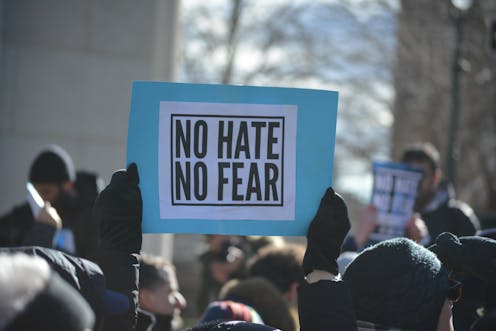
The violence in Israel and Palestine has reached brutal and devastating levels in recent weeks. Thousands have been killed and injured. Witnessing the extreme violence against civilians has been polarizing for many around the world.
In such a climate, potential hate crimes and the spillover effects of the ongoing conflict need to be addressed and governments need to take action to prevent grave consequences. Dehumanizing rhetoric is further inflaming the situation and risks leading to even more extreme violence.
Already, we have witnessed tragic consequences of the violence unfold in different communities. A Chicago-area man was recently arrested and charged with murder and hate crimes after police alleged he stabbed a six-year-old Palestinian-American boy to death.
Police in Toronto and Montreal have reported an increase in hate crime calls since the beginning of the conflict on Oct. 7.
Hate on the rise
Recent statistics indicate that religiously motivated hate crimes are on the rise in Canada. There has been a 67 per cent increase in police-reported hate crimes from 2020 to 2021, with a specific rise in hate crimes against Muslim (71 per cent) and Jewish (47 per cent) Canadians.
Canada has the fourth-largest Jewish community in the world, with a population of over 390,000, and a Muslim population of around two million people. In recent years, there have been violent attacks against Muslim Canadians such as the killing of the Afzaal family in London, Ont., the mosque attack that killed six Muslims during prayers in Québec, and violent attacks against hijab-wearing Muslim women in Alberta.
Read more: How Islamophobia and anti-Palestinian racism are manufactured through disinformation
Jewish Canadians have been attacked through a variety of hate crimes including vandalism and graffiti, online and offline racist propaganda and bomb threats to Jewish schools and community centres.
Conflicts trigger hate crimes
A 2021 study from the United States explored whether the Israeli-Palestinian conflict leads to acts of hatred towards Jews and Muslims. The study discovered that instances of conflict trigger hate crimes, displaying a retaliatory trend: occurrences of hate crimes against Jews escalate following Israeli assaults, whereas incidents of hate crimes against Muslims increase after Palestinian attacks.
The threat against Muslim and Jewish communities has become more concerning given the rising violence in the region and its potential spillover.
These effects on diaspora groups have been observed across different countries. Turkish and Kurdish diasporas in Europe have been affected by the decades-long conflict between the Turkish government and the Kurdistan Workers’ Party.
Occasional tensions and violence break out between diaspora communities, especially when the political situation back home becomes fraught or violent. Similar tensions have been seen between Turkish and Armenian diasporas and Hindu and Muslim diasporas.
Rising hate crimes can negatively affect the psychological and physical well-being of diaspora communities. Even if they are not directly targeted, people can experience fear and insecurity in their daily lives.
In a recent research study on the impacts of hate crimes, colleagues and I found that victims significantly changed their lifestyles to avoid conflict; as a result, they became alienated from their own community and society. These changes might include moving to another neighbourhood or city, changing daily routines and avoiding being in certain places and attending group activities.
Canada’s role
To prevent the spillover effects of the conflict between Israel and Hamas, the Canadian government should take a proactive role. This includes fostering a sincere dialogue and understanding among diverse communities through genuine campaigns and listening to the concerns of each affected community. Community leaders must also be involved in these efforts.
Establishing hate crime investigation units within Canadian police forces is a more professional approach to preventing and investigating hate crimes. Communities should be informed about the existence of these units, and invited to come forward when they feel intimidated or witness any hate crimes. Police officers should also be trained about the unique aspects of international conflicts and how best to intervene in conflicts among diaspora groups.
In a broader sense, the Canadian government should actively engage in diplomatic efforts through international organizations and bilateral relationships to reduce the violence we are now seeing.
Canada has committed to provide humanitarian assistance to Gaza and called for “humanitarian pauses on hostilities,” but much more must be done to ensure a fair and peaceful resolution. Much of the world has called for an immediate ceasefire, however, Canada remains among a minority of countries to not do so.
Canada must join calls for an urgent ceasefire to end the violence in Israel and Palestine, and avoid violence at home.
Davut Akca does not work for, consult, own shares in or receive funding from any company or organisation that would benefit from this article, and has disclosed no relevant affiliations beyond their academic appointment.
This article was originally published on The Conversation. Read the original article.







